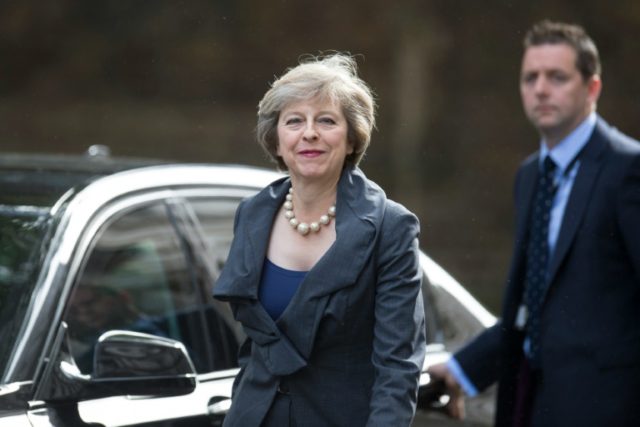London (AFP) – From negotiating Britain’s exit from the EU and shoring up the economy, to mending the divisions corroding her party and country, incoming prime minister Theresa May faces a daunting to-do list.
The interior minister, who takes over Wednesday from David Cameron less than three weeks after Britain’s shock decision to quit the EU, has vowed to clinch the best possible divorce settlement from Brussels.
She has also promised a more compassionate brand of conservatism that “works not for a privileged few” but for all Britons.
Following is a list of the most pressing tasks at hand.
– Form a government –
May’s first task is to form a new cabinet, including a minister in charge of Brexit.
Women are tipped to take a number of top jobs, in a team expected to mix experienced hands, like foreign minister Philip Hammond, with some who supported the “Leave” campaign, like May’s campaign manager Chris Grayling.
– Serve divorce papers –
May, who was an unenthusiastic Remain supporter, has insisted that “Brexit means Brexit”.
She has said she does not plan on triggering Article 50 — which starts a two-year clock on the country’s exit from the bloc — before the end of the year.
However, that was before the Conservative leadership contest, which was due to last until September, was cut short by the withdrawal of her only rival, giving May the keys to Downing Street two months early.
EU leaders have called on the government to accelerate the exit process, saying they will not discuss the contours of a new relationship with London until it has formally filed for divorce.
Within Britain, May is also under pressure from Brexit supporters within her Conservative party and the UK Independence Party (UKIP) to implement the referendum result.
Analysts said she will come under increased pressure from the autumn, when EU leaders meet in Brussels, to bite the bullet.
– Trade/migration trade-off –
May says that Brexit means an end to the free movement of labour across Britain’s borders but promised to pursue the “the best deal for Britain” with the EU.
EU leaders, including German Chancellor Angela Merkel, insist that the holy grail — continued tariff-free access to the EU cherished by British companies — is contingent on unfettered access to Britain for EU workers.
May’s challenge will be to negotiate a compromise that protects the bulk of Britain’s trade with Europe while cutting mass migration, which had been a key issue in the referendum debate.
– Safeguarding economy –
With the pound see-sawing dangerously against the dollar, the Bank of England warned last week that some of the fears for the economy post-Brexit had “begun to crystallise”.
While the low pound has boosted exports, several property funds have suspended trading for fear of a capital flight. Banks had warned before the vote that a Brexit might force them to move some operations out of the country.
May’s task will be to reassure investors that Britain has set a course on how to untangle from the EU that minimises the fallout for trade, jobs and the cost of living.
She has also taken onboard anger over rampant inequality, vowing to give workers more of a say in executive pay.
– Uniting Conservatives –
May inherits a Conservative Party split between those who supported the government’s campaign to remain in the EU, like herself, and dissidents like Boris Johnson, Michael Gove and Andrea Leadsom.
Gove and Leadsom both ran against May for the leadership but crashed out mid-race, while Johnson, who was the hot favourite to succeed Cameron, caused surprise by abstaining.
The trio has publicly now rowed in behind May, but with a slim majority in parliament May faces a delicate balancing act to keep all party factions on board.
– Uniting the kingdom –
May also finds herself surveying a kingdom threatened with collapse after Scotland, which voted overwhelmingly to stay in the EU, threatened to organise a new referendum on exiting the UK.
May has listed defending the union as a “major priority”.
– Nuclear weapons –
One of the first tests of May’s leadership comes on July 18, when MPs are asked to vote on the government’s proposal to renew Britain’s “Trident” nuclear weapons system.
Cameron, who scheduled the vote as one of his last acts as premier, has called it an “essential deterrent”.
Opposition Labour leader, anti-war campaigner Jeremy Corbyn, wants the system scrapped.

COMMENTS
Please let us know if you're having issues with commenting.